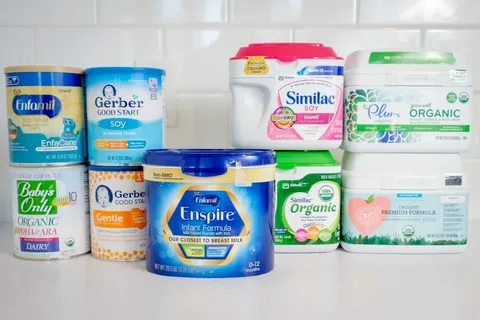Choosing the right formula for a newborn is a major decision for many Kiwi parents. With a growing interest in natural and chemical-free products, the debate around organic versus regular infant formulas is more relevant than ever. This article explores the key differences between organic and regular newborn formula in NZ, helping you make an informed choice for your baby.
What is Organic Newborn Formula?
Organic newborn formula is made using ingredients that are grown and processed without synthetic pesticides, herbicides, or genetically modified organisms (GMOs). In New Zealand, products labelled organic must meet strict standards set by certification bodies such as BioGro NZ or AsureQuality.
Key characteristics of organic formulas include:
- Milk sourced from grass-fed cows not treated with growth hormones or antibiotics.
- No artificial colours, flavours, or preservatives.
- Use of certified organic carbohydrates and oils.
Parents often choose organic formula to reduce their baby’s exposure to potentially harmful chemicals and support more sustainable farming practices.
What is Regular Newborn Formula?
Regular newborn formula in NZ is widely available and meets all nutritional standards set by regulatory bodies such as the Ministry for Primary Industries (MPI). These formulas may include ingredients derived from conventionally farmed sources, which can involve the use of synthetic pesticides or fertilizers.
Benefits of regular formula include:
- More affordable pricing.
- Wider product range and availability.
- Fortified with essential nutrients such as iron, DHA, and prebiotics.
Many babies thrive on regular formula, and for some families, it’s the most practical option due to cost and convenience.
Comparing Organic and Regular Newborn Formula in NZ
When comparing organic and regular newborn formula in NZ, it’s important to look beyond just the labels. While both types are designed to provide complete nutrition, they differ in terms of ingredient sourcing, environmental impact, and often price.
| Feature | Organic Formula | Regular Formula |
| Ingredient Sourcing | Certified organic, non-GMO | Conventionally farmed |
| Additives and Preservatives | None or minimal | May contain additives |
| Price | Generally higher | More budget-friendly |
| Availability | Less widely available | Easily found in most supermarkets |
What’s Best for Your Baby?
There is no one-size-fits-all answer. Some parents may prefer the clean-label and eco-conscious appeal of organic formulas, while others prioritize affordability and ease of access. Regardless of your choice, both organic and regular newborn formulas in NZ must meet strict health and safety regulations, ensuring that your baby receives the essential nutrients needed for healthy growth and development.
Final Thoughts
Comparing organic and regular newborn formula NZ helps parents better understand the trade-offs and benefits of each option. Whether you opt for organic to avoid chemical exposure or choose regular formula for its practicality, the most important factor is that your baby is happy, healthy, and well-nourished.


